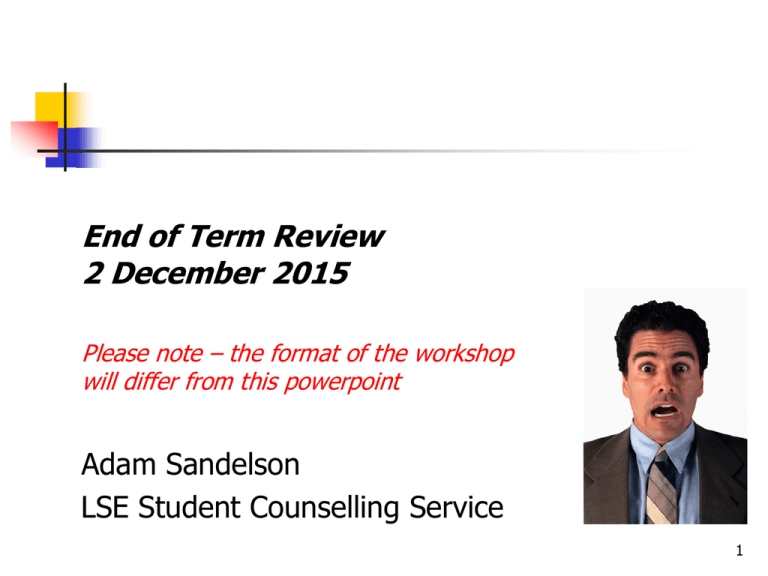End of Term Review 2 December 2015 Adam Sandelson LSE Student Counselling Service
advertisement

End of Term Review 2 December 2015 Please note – the format of the workshop will differ from this powerpoint Adam Sandelson LSE Student Counselling Service 1 Aims Review progress over the first term Anticipate future challenges Practical approaches Stress management skills Sources of advice and help 2 Part 1 What progress have you made in the first term? 3 Initial challenges Transition - leaving behind the familiar and adapting to the new Coping with loss, after initial excitement subsides Meeting new people Academic challenges 4 The Social Side of Settling in Making new friends Meeting people from similar and different backgrounds Keeping contact with people from home Balancing from work and leisure. Being realistic about what to expect Give yourself time to adjust Looking after yourself - food and sleep 5 Settling in: The Academic side Adjusting to a new level of study Adjusting to self-directed learning Trying to keep previous standards Adjusting reading strategies Presentations and essays The tutor relationship 6 Academic challenges Feeling overwhelmed with material Adapting to a new style of learning Needing time to develop an independent critical voice Anxiety can lead to procrastination We may disguise avoidance by being very busy We may find things to do that are interesting or even useful, but don't contribute towards the main goal 7 Reviewing expectations What were your initial expectations? Social Cultural Academic How has your actual experience worked out? 8 Part 2 What are the future work challenges facing you as a student? 9 Future work challenges Sustaining momentum Academic support Divergent tutor/ student expectations Essays, exams and the dissertation Making decisions about the future – jobs, internships, PhD’s, location, relationships Sorting out your whole life in 1 year 10 Underlying dynamics Trying to please others Wanting to be the best Being a perfectionist The family / historic context for your success, eg keeping the family together Setting yourself impossible targets Re-enacting anxiety, trauma, failure … 11 Dynamics of study Past relationships Current relationships Relationship with LSE or course of study or tutor or … 12 Keeping perfectionism in check Perfectionist attitudes can reduce achievement They deny you satisfaction and cause you to achieve far less Perfectionism is undesirable and an illusion! Experiment with your standards for success: try for 80% Focus on the process of doing an activity not just the end result. Evaluate success in terms of what you accomplished and whether you enjoyed the task 13 Part 3 What are the practical ways of dealing with future challenges? 14 Practical approaches Revise and develop your study skills Time management skills Realistic and achieveable goals Short term targets and longer term strategies Recognise achievements Concentrate on the task, not the outcome Talk to others, ask for help and support 15 Focussing on the task Break down huge activities into small manageable tasks Remember past successes you are likely to pass! Allow time for breaks … space to breathe … and think Mind maps, scribble ideas Go for a walk, talk out loud 16 Part 4 Review your Stress Management Skills 17 Stress Management Skills Physical, behavioural, cognitive Regularly switch off with some kind of physical activity Good self care – sleep, diet, caffeine, alcohol and nicotine Allow yourself time out without guilt Acknowledge anxiety, rather than denying it. Ask if your negative thoughts are realistic 18 Challenging negative thoughts Apply ‘Socratic reasoning’ or imagine this being tested in a Court of Law Identify the negative thought Eg, I can’t do this Course Ascertain the evidence For and Against Ask if you are making a ‘thinking error’ Propose a more reasonable alternative thought 19 Thinking errors All or nothing thinking Discounting the positive/ tunnel vision Overgeneralizing only seeing the negative side of things because it happened in the past it will happen again in the future Believing a catastrophe will happen Emotional Reasoning If I feel it then it must be true 20 Evaluate your approach What are the biggest challenges facing you over the coming year Where can you most usefully improve your existing work strategies and coping skills? 21 LSE Student Counselling Service – KSW.507 Free and confidential Mainly short term counselling Book appointments in advance See Website for Stress management handouts Self help resources Relaxation MP3’s Sources of advice and help Academic Adviser Disability and Wellbeing Service TLC study skills advisors Student Union and Advice Centre Mental Health and Wellbeing Advisors Departmental Staff Student Services Centre Learning World Medical Centre Deans Don't wait until problems have grown impossibly large It’s OK to ask for help earlier 23 Forthcoming Groups Stress Management Group (3 weeks) Self Esteem Group (3 weeks) Therapy Group Places on all groups need to be booked in advance. Please see the website, Call Ext 3627, visit KSW.507 or email student.counselling@lse.ac.uk. 24